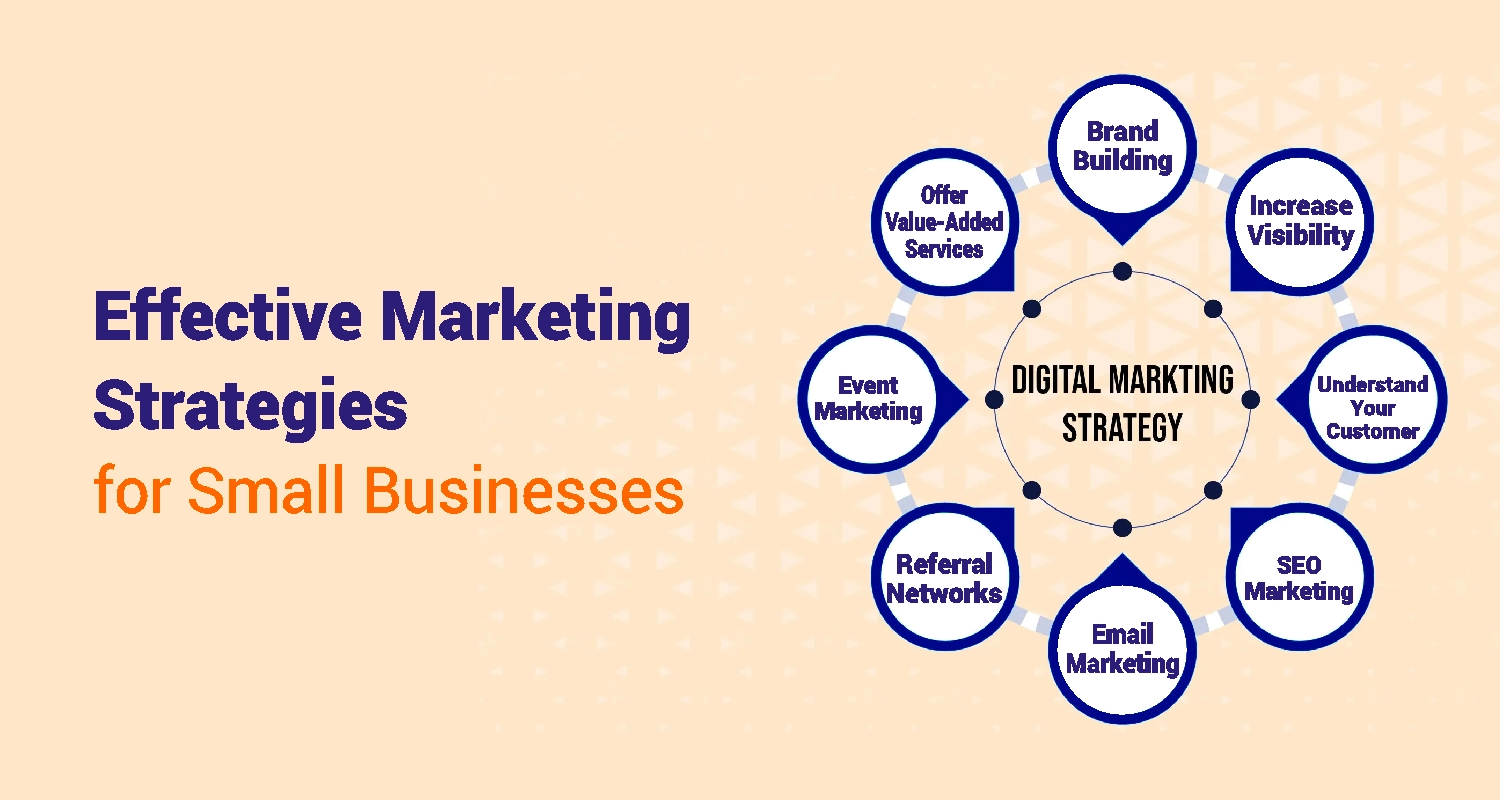Best Marketing Strategy for Small Businesses in 2024

As small businesses are in the spotlight of late, they prove entrepreneurship is not just for big corporations to shine. The rise of digital innovation, social media, and e-commerce allows these humble entities to compete and thrive alongside industry giants. While these small enterprises and entrepreneurs boost a country's economy, create jobs, and promote innovation, they must adapt and evolve their marketing strategies to be ahead of the competition. In recent times, effective marketing has no longer been about elaborate campaigns or big spending.
This blog post explores the best marketing strategies for small businesses in 2024, from online to offline marketing and more. Whether a startup or an established entity, here's how small businesses can attract new customers and make their business grow.
What is a Small Business?
A small business is an independently owned and operated enterprise with limited resources, employees, and revenues. Small businesses include diverse sectors, from retail and hospitality to tech startups and professional services. Despite their size, these enterprises drive economic growth, innovation, and job creation, making them important for the economy.
Small Business Marketing Meaning
Small business marketing refers to promoting a business's brand, products, or services to retain customers and attract new ones, thereby driving revenue and growth. Effective small business marketing requires a keen understanding of target audiences and their needs, besides developing unique value propositions. Unlike large corporations, small businesses often lack extensive marketing budgets and infrastructure. Instead, they focus on building strong customer relationships, utilizing local networks, and adapting to changing market trends and consumer behaviors.
Why Marketing is Crucial for Small Businesses
Marketing plays an important role in any small business's success for several reasons:
- Increased Visibility: Effective marketing helps small businesses gain visibility in the marketplace, making them known to potential customers.
- Retaining and Gaining Customers: Strong marketing strategies attract new customers and drive sales.
- Brand Building: Consistent marketing efforts help build a recognizable brand identity, fostering customer loyalty.
- Competitive Advantage: A robust marketing plan can give small businesses a competitive edge over other small and also larger competitors.
Key Marketing Strategies for Small Businesses
To begin with, you must define specific business goals, such as boosting sales and growing your business. You must also focus on marketing goals, such as increasing website traffic, generating leads, etc. Here's a detailed lowdown on how:
Sapna aapka. Business Loan Humara.
Apply NowBuild a Strong Brand Identity
A strong brand identity is the foundation of successful marketing that enhances solid business techniques. As a small business, you must define its USP, target audience, and brand personality. Develop a consistent brand look and feel, including a memorable logo, color palette, and tagline.
Understand Your Customer: Knowing your target audience well is crucial to create a marketing strategy that provides them personalized services. With more and more customers looking for customized experiences, you must research their demographics, interests, preferences, and challenges. This will help you curate content and messages that resonate with them.
Create an Impressive and User-Friendly Website: Your website is usually the first impression customers have of your business. Thus, one of the most effective marketing tips for a small business is making a website that’s visually appealing, easy to navigate, and mobile-friendly. The website can also be your way to share your story, showcase expertise, and drive traffic through search engines and social media channels. Getting started requires a few easy steps: registering a domain name, finalizing a web host, and selecting a content management system (CMS).
Search Engine Optimization (SEO) Marketing: SEO involves optimizing your website's content and structure to rank higher in search engine results pages (SERPs). By doing a keyword research, you can identify relevant terms, words, and phrases your target audience is searching for.
Get Listed on Google My Business: Have your Google My Business listing that provides accurate information about your business, including address, phone number, and hours of operation. Your local search ranking will improve if you encourage customers to leave reviews about your business.
Email Marketing: Build an emailer list and send targeted campaigns to build relationships with existing customers and bring in new ones. Offering valuable content, promotions, and exclusive offers will keep your audience engaged.
Social Media Marketing: With the world online 24/7, social media is one of the most effective marketing techniques. Research the social media platforms your customers are most active on. Create engaging content for those platforms by sharing updates about your products or services, behind-the-scenes posts, and valuable industry insights.
Traditional Marketing: While starting a digital marketing business is crucial in today’s world, don’t overlook traditional channels like print advertising, radio, and television, which continue to be popular and effective avenues. Consider your customers' demographics and the effectiveness of these channels in reaching them.
Collaborate with Influencers: Partnering with influencers in the industry you cater to will help you reach a wider audience and gain credibility. Influencer marketing entails offering them free products or services in exchange for promoting your business.
Partner with Other Businesses: Form strategic partnerships with other businesses in your domain and cross-promote products or services to reach new customers.
Offer Value-Added Services: Providing additional benefits or services that make your business stand apart from competitors will go a long way. This could include free consultations, loyalty programs, or exclusive discounts.
Referral Networks: Encourage satisfied customers to refer your business to their friends and family. Offer incentives for successful referrals to incentivize word-of-mouth marketing.
Event Marketing: Attend industry events, conferences, or trade shows to network with potential customers. This will allow you to publicize your products or services, and build brand awareness.
Conclusion
Marketing is as important for small businesses as it is for established ones. Smaller enterprises can rely on content, email, SEO, and social media marketing besides traditional marketing to ensure growth. With this, they can reach their target audience, build brand awareness, and ensure business growth. However, besides knowing how to market your business, while these strategies will hold you in good stead, they must track progress from time to time, measure the effectiveness of your strategies, and make necessary adjustments.
FAQs
Q1. What is the most important marketing strategy for small businesses?Ans. The most important strategy depends on your specific business goals and target audience. However, a strong brand identity, effective content marketing, and a focus on customer experience are generally essential.
Q2. How can small businesses compete with larger companies in terms of marketing?Ans. Small businesses can succeed by being flexible, personal, and customer-focused. This helps build strong relationships, loyalty, and delivers great service. By targeting the right customers and providing wholesome experiences, small businesses can stand out.
Q3. What is the role of social media in small business marketing?Ans. Social media platforms are a great way to build brand awareness, listen to your customers, and drive engagement. Use this tool to share respond to customer reviews and inquiries, provide valuable content, and participate in relevant conversations.
Q4. How can a small business measure its marketing's effectiveness?Ans. Track key performance indicators (KPIs) like social media engagement, website traffic, conversion rates, and lead generation to evaluate your marketing strategy's success. Adjust your approach based on data-driven insights.
Q5. What common marketing mistakes must small businesses avoid?Ans. Unclear branding, inconsistent messaging, a lack of customer research, and not enough budget allocation are some common mistakes to avoid. Defining your target audience, creating a focused marketing plan, and regularly monitoring progress will allow you to do this.
Sapna aapka. Business Loan Humara.
Apply NowDisclaimer: The information contained in this post is for general information purposes only. IIFL Finance Limited (including its associates and affiliates) ("the Company") assumes no liability or responsibility for any errors or omissions in the contents of this post and under no circumstances shall the Company be liable for any damage, loss, injury or disappointment etc. suffered by any reader. All information in this post is provided "as is", with no guarantee of completeness, accuracy, timeliness or of the results etc. obtained from the use of this information, and without warranty of any kind, express or implied, including, but not limited to warranties of performance, merchantability and fitness for a particular purpose. Given the changing nature of laws, rules and regulations, there may be delays, omissions or inaccuracies in the information contained in this post. The information on this post is provided with the understanding that the Company is not herein engaged in rendering legal, accounting, tax, or other professional advice and services. As such, it should not be used as a substitute for consultation with professional accounting, tax, legal or other competent advisers. This post may contain views and opinions which are those of the authors and do not necessarily reflect the official policy or position of any other agency or organization. This post may also contain links to external websites that are not provided or maintained by or in any way affiliated with the Company and the Company does not guarantee the accuracy, relevance, timeliness, or completeness of any information on these external websites. Any/ all (Gold/ Personal/ Business) loan product specifications and information that maybe stated in this post are subject to change from time to time, readers are advised to reach out to the Company for current specifications of the said (Gold/ Personal/ Business) loan.



